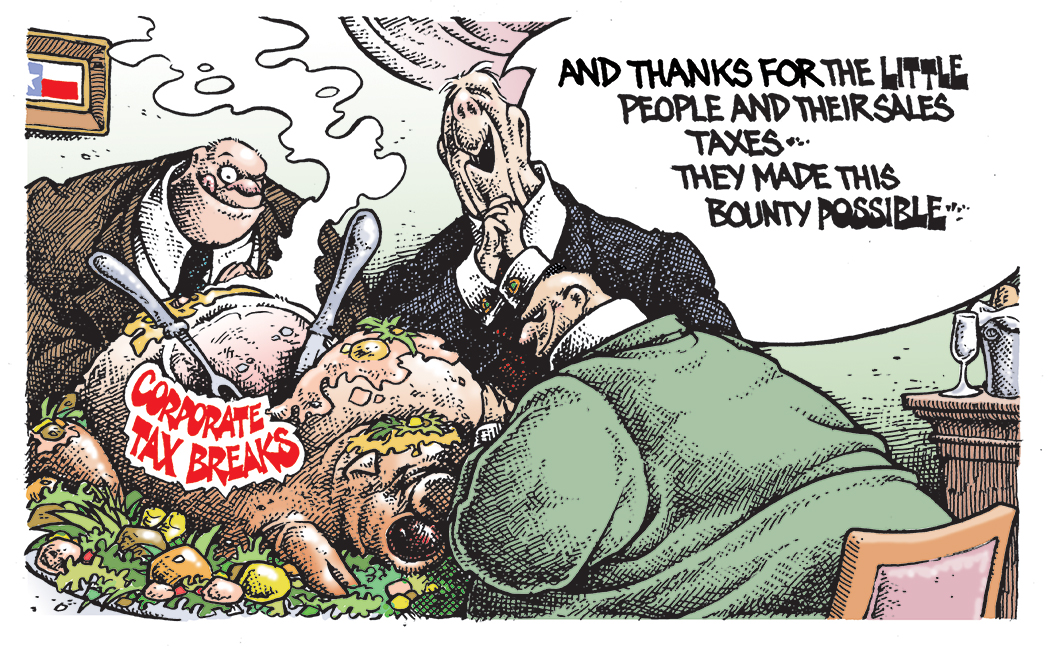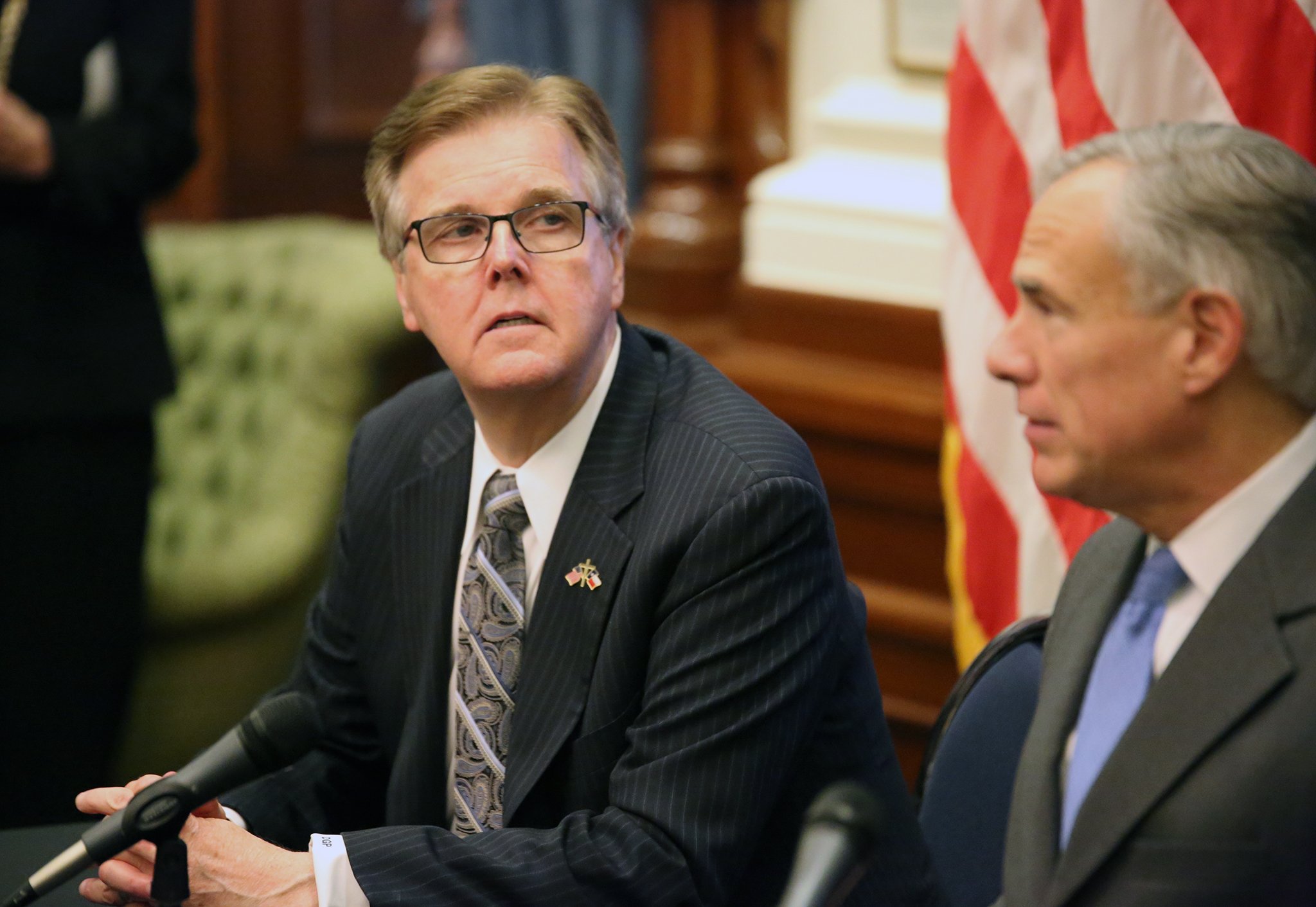
GOP Leadership’s Tax Swap Tests the Limits of the Texas Trickle-Down
Abbott, Patrick and Bonnen are doubling down on a proposal that raises taxes on the majority of Texans and help only a rarified few. Even Republicans are spooked.

Dan Patrick’s face said it all. At a Friday afternoon press conference in the Texas Capitol, the lieutenant governor looked downright sullen as Governor Greg Abbott finally admitted what everyone in the Legislature had known for months: Republicans’ high-profile plan to cap the growth of local property tax revenue at punishingly low annual rates would merely slow the increase of homeowners’ tax bills. A tax cut, it was not.
As the session has advanced, the Empower Texans wing of the GOP has grown increasingly livid that party leadership, Patrick in particular, seemed to be sacrificing major property tax overhaul in favor of pumping billions of state dollars into public schools.
“If the free market worked for tenants, there would be no homelessness. I have zero expectation that a property tax break for landlords will be passed on to tenants.”
In a desperate attempt to assuage their critics, the Big Three are doubling down on their plan — formally known as HJR 3 — to secure a tax cut with a tax hike. Abbott, Patrick and House Speaker Dennis Bonnen are proposing to raise the state sales tax by 16 percent (a one cent increase to the rate) as a way to finance a big buydown of local school property taxes. This would put the Lone Star State in a tie with California for the nation’s highest sales tax rate. It’s no wonder Patrick, ever the anti-tax crusader, seems to prefer showing his mug on Fox News than before the Texas Senate.
The so-called tax swap has prompted more backlash than GOP leadership may have anticipated, forcing rank-and-file Republicans to grapple with the short-term political realities created by their party’s long-term ideological project. A generation’s worth of GOP-led tax and spending cuts have fueled an internecine crisis of underfunded schools and soaring property taxes. It’s called the Texas Miracle.
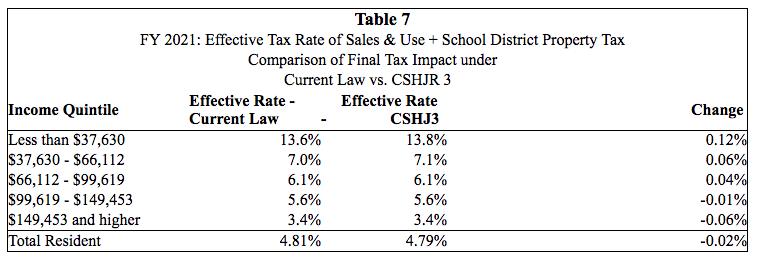
In an effort to slap a Band Aid on that festering wound, The Big Three is testing the political limits of trickle-down economics: How long will their party march in lockstep with a plan that raises taxes on the vast majority of Texans while benefiting only the upper echelon? The proposed sales tax swap would only deliver a net tax cut to households making more than $150,000, about 10 percent of Texans, the Legislative Budget Board found in a new report.
Disgruntled GOP lawmakers are circulating numbers, according to reporter and Capitol insider Scott Braddock, showing that the tax swap would only start kicking in relief for homeowners with properties worth at least $700,000. An unnamed Republic House member, who was nearly ousted in 2018, told Braddock, “That’s certainly not what my district looks like.”
Yet Abbott, Bonnen and even Patrick showed Friday that they have no intention of mothballing their tax swap scheme. They spun their plan, in tandem with stringent local property tax revenue caps, as the only viable way to provide lasting relief for homeowners.
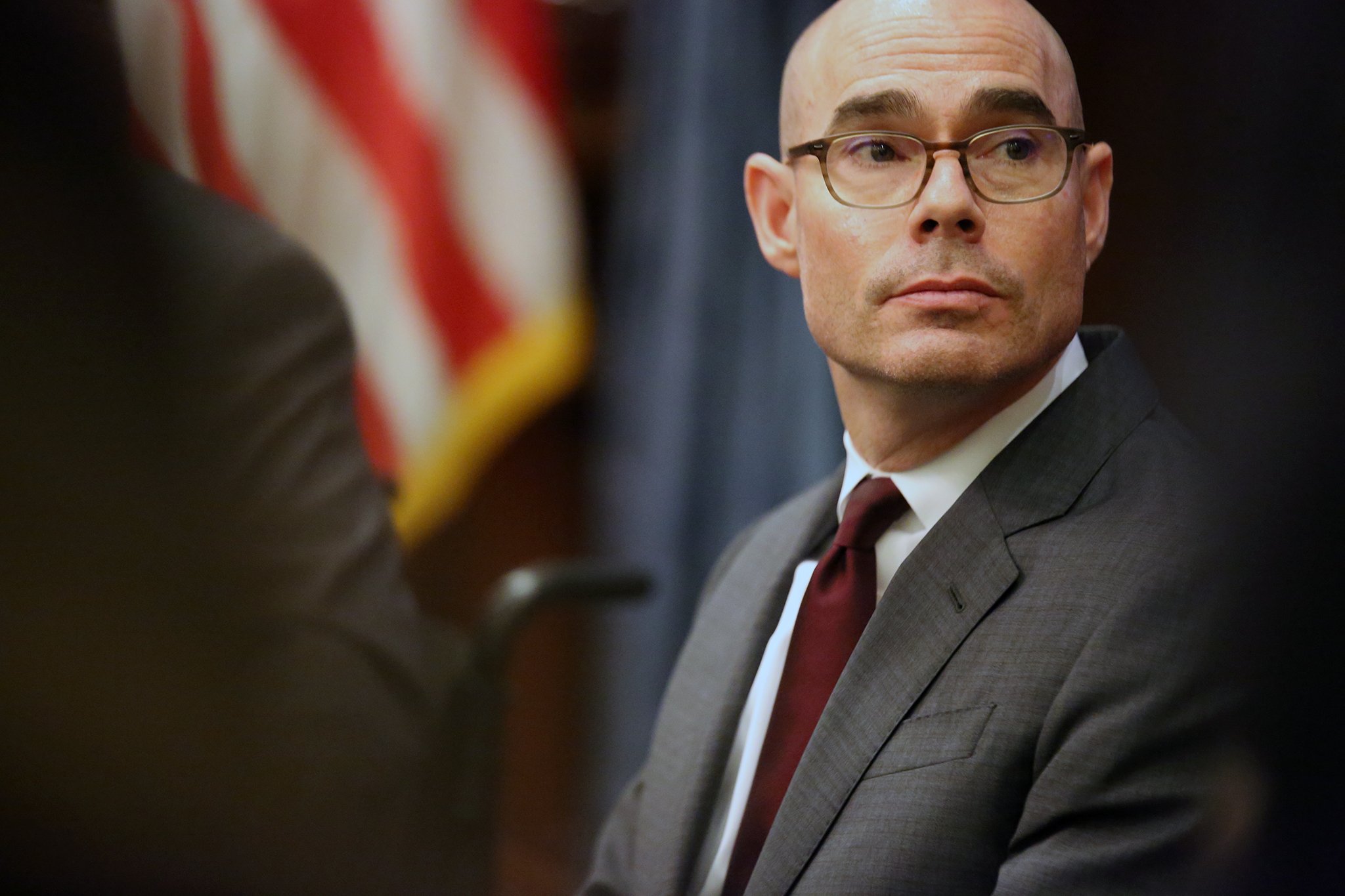
“Every Texan will see a reduction in their property tax bill,” Abbott promised, saying that the plan would “at bare minimum” reduce local school property taxes by up to 20 percent. Patrick provided reinforcements: “There is absolutely no question that … in the next five years, people in Texas are going to be saving thousands of dollars of what they would have been paying [without the tax swap].”
Abbott rejected the notion that their proposed property tax relief would only help a rarified few. “Everybody pays property taxes,” Abbott said, whether it’s directly to the tax assessor or indirectly to a landlord. Under the plan, the governor insisted, landlords will no longer have to raise the rent to keep up with their growing property tax bills. “Through the open marketplaces, that will be a reduction in the cost of living if you’re a tenant,” he said.
Asked whether the proposal would include any sort of requirements mandating landlords’ altruism, Abbott said no. Instead, he said he had faith that the free market would do more than any “heavy-handed regulatory regime,” such as rent control.
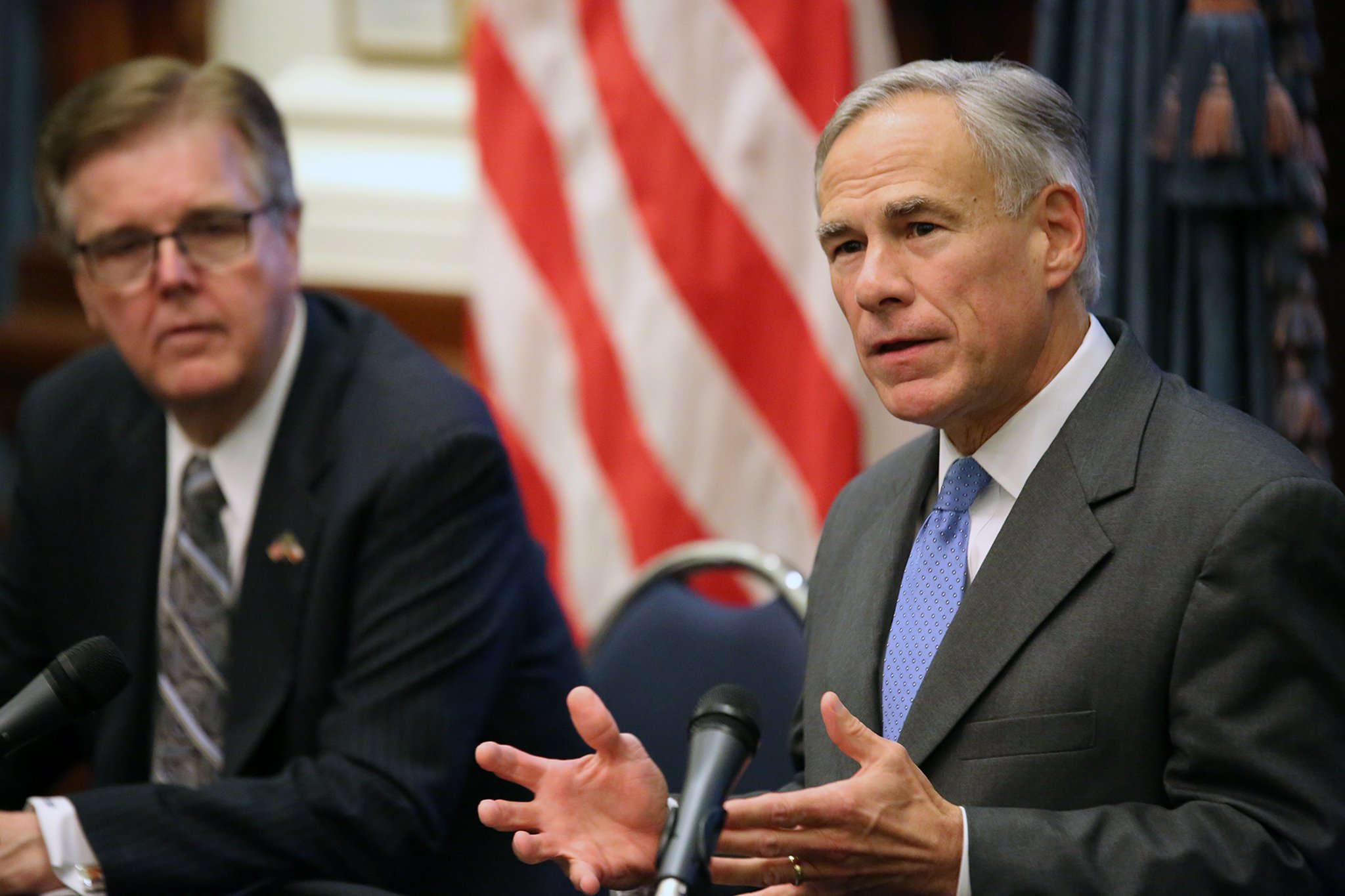
Affordable housing advocates dismiss this faith as economic naïveté. “If the free market worked for tenants, there would be no homelessness,” Sandy Rollins, director of the Texas Tenants’ Union, told the Observer. “I have zero expectation that a property tax break for landlords will be passed on to tenants. We have never heard of a landlord sending a notice of a rent decrease.”
Abbott extended that logic to businesses that rent retail space, saying that money they save in future rent will be passed along to consumers via cheaper prices on everything from clothes to diapers and groceries. This, of course, is not how trickle-down economics has historically worked out. One need only look to the Trump tax cuts: Republicans promised that steep corporate tax cuts would prompt companies to cut product prices, expand research and development and pay their workers more. Instead, Big Business used that money to issue lucrative dividends to shareholders and buy back their own stock, further enriching executives. Meanwhile, most Americans are left with crumbs; some are even stuck paying more in taxes.
Party leadership seems to think there’s broad support in Texas for their swap scheme. They want to enshrine the sales tax hike via a constitutional amendment, which would require a two-thirds majority from both chambers and a simple majority from voters in the next election. But that’s a steep political climb.
“I trust no one. They are totally going to screw us. No way property taxes go down as much as sales taxes go up.”
The swap would create few winners and a whole lot of losers, including almost every Texas legislative district. “I think, being generous, there are eight [of 150] House members where this is a 50-50 proposition,” House Democrat Trey Martinez Fischer said at a press conference Monday morning, referring to districts where 50 percent of taxpayers would receive a net tax cut.
The GOP is bringing in its top political consultants to the Capitol this week to convince nervous Republicans that voting for the tax swap is not political suicide. Party leadership apparently got the Legislative Budget Board to run the combined effects of the sales tax swap and current House school finance bill, which painted a different picture: all Texans would get a net tax cut.
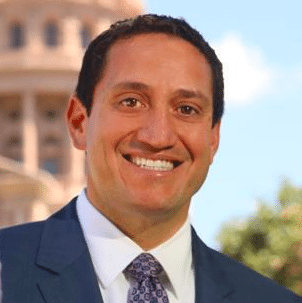
Martinez Fischer said Republicans are using Jedi mind tricks: The new fiscal analysis is an attempt to “blur the vision and say, ‘These aren’t the droids you’re looking for.’” In short, he said, they’re leaning on the outsized fiscal benefits of the school finance bill to obscure the harm of the tax swap and calm the nerves of shaky members.
But Abbott, Patrick and Bonnen may have already lost one of its key allies: the AM radio airwaves. On Friday, Mark Davis, one of the most influential conservative talk radio hosts in Texas, lashed out on Twitter: “I trust no one. They are totally going to screw us. No way property taxes go down as much as sales taxes go up. The proud Texas tradition as a low tax oasis has become a mirage.”
Perhaps Republicans have finally taken the Texas trickle-down one step too far.



